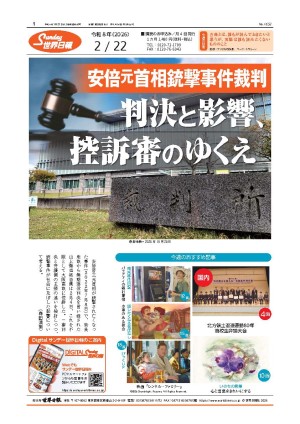- オピニオン
- NEWSクローズ・アップ
- 海外メディア
- メディア批評
- 国際
- 政治
- 沖縄
- 教育
- コラム
- 連載
- 韓国の選択 次期大統領・尹錫悦氏
- ウクライナ危機-識者に聞く
- 「台湾有事」のシナリオ
- アメリカLGBT事情
- 中央アジアから見る アフガン情勢
- ポスト菅 宰相の条件
- 期待されるイベルメクチン―大村智博士に聞く
- 赫き群青 いま問い直す太平洋戦史
- ’21首都決戦
- ナショナリズム再考 「ハゾニー主義」を読み解く
- 「衆参3選挙」現地ルポ
- 米国優位を奪う中国
- 東日本大震災10年 未来に繋げる希望
- バイデンのアメリカ 先鋭化するリベラル路線
- バイデンのアメリカ
- 金正恩氏の思惑 北朝鮮第8回党大会
- 濱口和久の「防災・減災」対談
- 学術会議と日本共産党
- 継承と前進 菅新内閣の課題
- ポスト安倍 宰相の条件
- 決戦まで2カ月―米大統領選の焦
- 謎多き新型コロナ PCR検査の“限界”と抗体検査
- 内モンゴルで進む文化殺戮
- 緊急事態と憲法 私の提言
- WHOトップ解剖 テドロス氏とは何者か
- 台湾総統選 吹いた蔡旋風
- アメリカの選択 展望2020大統領選
- 新春座談会 令和の外交と安保―待ったなし憲法改正
- 米大統領選まで1年 トランプ政権の攻防
- 新閣僚インタビュー
- 直筆御製に記された昭和天皇の大御心
- 地方創生・少子化対策 首長は挑む
- 日韓打開 私はこう考える
- 何処へゆく韓国 「親北反日」の迷路
- 令和参院選 注目区を行く
- 大阪G20サミット焦点
- どう動く米朝
- 米朝決裂
- 金正恩体制を斬る 太永浩・元駐英北朝鮮公使に聞く
- 米中新冷戦 第3部 識者インタビュー
- 米中新冷戦 第2部 中国・覇権への野望
- 米中新冷戦 第1部「幻想」から覚めた米国
- 迷走する北非核化
- 人口減少社会を超えて 第3部・識者インタビュー
- 波紋呼ぶLGBT請願
- 検証’18米中間選挙
- 人口減少社会を超えて 第2部・戦後人口政策の誤り
- 新閣僚に聞く
- 米国の分断 第3部 「自虐主義」の源流
- 懸案にどう挑む 第4次安倍改造内閣
- 平壌共同宣言の波紋
- '18沖縄県知事選ルポ
- フィンランド100年の児童支援 「ネウボラ」の現場
- 中国「一帯一路」最前線 バルカンに吹く風
- 人口減少社会を超えて 第1部・先駆けの地方移住
- 米国の分断 第2部 反米・容共の風潮
- 米朝“宴の後”で 非核化・拉致問題の行方
- 米朝首脳会談の焦点
- どうなる米朝首脳会談
- 米国の分断 第1部 断罪される偉人たち
- 検証 南北首脳会談
- 歪められた沖縄戦史 慶良間諸島「集団自決」の真実
- 「赤旗」役所内勧誘の実態
- 「米国第一」を問う トランプを動かす世界観
- 憲法改正 私はこう考える
- どう見る北の脅威
- トランプのアメリカ 就任から1年
- 危機のアジア 識者に聞く
- トランプVSリベラル・メディア
- 衆院選大勝 安倍政権への提言
- 2017衆院選 国難と選択
- どう見る北の脅威
- 北暴走 揺れる韓国
- ムスリム同胞団とアラブ モハメド・F・ファラハト氏に聞く
- 第3次改造内閣 信頼回復へ始動
- 南シナ海 強まる中国支配 安保専門家に聞く
- ’17首都決戦
- 北朝鮮 制裁の現実
- どう対処 北の脅威 米有識者に聞く
- 9年ぶり左派政権 文在寅大統領の韓国
- 施行から70年 憲法改正を問う
- 「情報戦争」時代と米国
- 弾劾の波紋 漂流する韓国政治
- 米軍再建への課題-元上級将校の提言
- トランプ政権始動
- どうなる「民共協力」 27回共産党大会の焦点
- 2017激動の世界を読む
- 検証・金正恩統治5年
- トランプ・ショック 再考・日本の国防
- どこへ行く混迷・韓国 国政介入事件の深層
- トランプ大統領の衝撃 米国と世界はどこに向かう
- 国防最前線・南西諸島はいま 第2部 自衛隊配備へ動く石垣島
- 国防最前線・南西諸島はいま 第1部 与那国島・陸自駐屯地
- トランプvsヒラリー 米大統領選まで1カ月
- オバマのLGBT外交 米国と途上国の「文化戦争」
- ドゥテルテ大統領就任から3カ月 どこへ向かう比政権
- 弾道ミサイルの脅威 日米の防空戦略を問う
- 蓮舫民進 疑問の船出
- 「ハイブリッド戦争」の脅威
- どう見る金正恩体制 日韓専門家対談
- 「立憲主義」について
- トランプVSヒラリー 米大統領選まで3カ月
- 再改造内閣 始動
- 中華圏に浸透する同性婚
- 迎撃ミサイル配備 韓国の決断
- 安倍政権 新たな挑戦
- 16参院選 注目区を行く
- オバマ外交と次期米大統領の課題
- 中台関係の行方
- 日米同盟と台湾 海洋安全保障の展望
- 伊勢志摩サミット
- 3代世襲“完成” 北朝鮮第7回党大会
- 検証 元料理人 藤本氏の再訪朝
- 憲法改正 ここが焦点
- 韓国総選挙ショック
- 筆坂元日本共産党ナンバー3と田村自民党政務調査会審議役が対談
- ASEANの夜明け アジアハイウエー7000キロルポ
- 多難な年明けのトルコ
- 激震・翁長県政 「オール沖縄」の凋落
- 台湾に吹いた蔡英文旋風
- 2016 世界はどう動く-識者に聞く
- 待ったなし地球温暖化対策
- JAXA宇宙探査計画
- EUと難民 UNHCRウィーン事務所報道官に聞く
- 緊張 南シナ海
- ロシアのシリア内戦介入 アルアハラム財団事務局長 モハメド・F・ファラハト氏に聞く
- 2016年米大統領選まで1年
- 中央アジア胎動 中国「新シルクロード」と日本の戦略
- 第3次安倍改造内閣スタート
- 環境先進国フランスの挑戦
- 普天間基地移設 経緯の検証と提言
- 迫る気候変動の脅威 どうする大災害への備え
- “政熱経熱”の中韓
- 戦後70年 識者は語る
- 詳解 集団的自衛権 安保法制案の合憲性
- 二極化する香港 識者インタビュー
- 再考 オバマの世界観
- 日韓国交正常化50年 識者に聞く
- どうする拉致解決 日朝ストックホルム合意1年
- 日韓国交正常化50年 「嫌韓」「反日」を越えて
- 2015 世界はどう動く 識者に聞く
- 衆院選 自公圧勝 ~課題と展望~
- ’14衆院選 注目区を行く
- 香港誌「前哨」編集長 劉達文氏に聞く
- 「雨傘革命」下の香港 揺れる一国二制度の行方
- 揺れる香港 各派リーダーに聞く
- 朝日新聞 大虚報の“ツケ”
- 第2次安倍改造内閣スタート
- 香港の普選運動 親中派民間団体代表の見方
- 日米首脳会談 成果と課題
- 新QDRと米中軍事バランス
- 2014世界はどう動く
- 張成沢氏失脚 北で何が起きたか
- 予防という名の人体実験
- オバマの対宗教戦争・第1部
- オバマの対宗教戦争・第2部
- 「援護法」に隠された沖縄戦の真実
- 新グレートゲーム・中国南進の海
- 新グレートゲーム・幻想だった中国の平和的台頭
- ポンペオ演説の衝撃 新局面に入った米中対決
- 米大統領選 コロナ禍での本格再開
- 1776vs1619 黒人差別めぐる米国の「歴史戦」
- 米同時テロ20年 アフガンの激震
- ’21衆院選 注目区を行く
- どう守る尖閣
- 第2次岸田内閣の政策課題
- 自民総裁選 焦点政策を検証
- 金正恩統治10年-私はこう見る
- 特集
- 共産党ウォッチ
北米・中南米のほかの記事
対訳ワシントンタイムズのほかの記事
© 2026 株式会社 世界日報社







